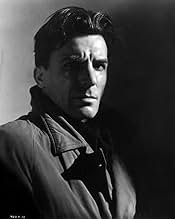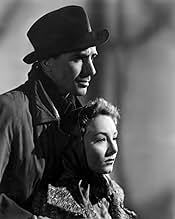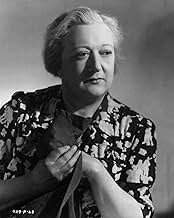Adicionar um enredo no seu idiomaA train disaster is told as four short stories to give character studies of the people involved, how it will affect them, and how they deal with it.A train disaster is told as four short stories to give character studies of the people involved, how it will affect them, and how they deal with it.A train disaster is told as four short stories to give character studies of the people involved, how it will affect them, and how they deal with it.
- Direção
- Roteiristas
- Artistas
Patric Doonan
- Ron Stacey (segment "The Engine Driver")
- (as Patrick Doonan/Patric Doonan)
Avaliações em destaque
This film is one of the finest achievements of British cinema in the immediate post-War period, having been shot in March of 1948 (as a calendar in one shot shows) and released in 1949. The film is remarkable for the 'introducing' of Peter Finch, who is absolutely brilliant as a tormented young man who has been driven mad by six years in the Army and his faithless and tormenting wife, played with skin-crawling provocation by the relentless Mary Morris, one of the finer actresses of that period. Their story is a distinct film noir strand in the tapestry woven of separate stories of people over the three days prior to their boarding an ill-fated train from London's Euston Station to Liverpool, on the ominously-named Platform 13. Although this is a film of multiple story-lines all converging on a single journey, they are all compelling, and there is no sense of lack of unity. In other words, the bold project of making this film paid off and is a complete creative success. The film is compulsive viewing for anyone familiar with or interested in how certain places and things looked in the London of 1948, as the location shooting is very extensive indeed, and it is in that sense like a time-capsule travelogue. I sat watching this recently released DVD with my finger on the pause button for the entire time. I must have stopped it and rewound thirty or forty times, all agog at how clearly it showed the immediate post-War Kings Cross area (now being totally redeveloped), the old Euston Station, the Strand, Trafalgar Square, and other locations. Anyone interested in steam trains will find the many detailed shots of them irresistible, because the train driver (solidly played by Jack Warner) is a main character, and we see every aspect of servicing, turning round, and operating the trains, with a thoroughness and multiplicity of close-ups of the machinery approaching that of a documentary, and reminding one of the famous documentary film NIGHT MAIL (1936). The film is never dull for a moment, but is constantly fascinating to watch, and operates on many levels successfully. There are such witty lines in the script, and the dialogue is often priceless, especially when the train driver and his wife are speaking to one another in their pungent manner at home. I laughed out loud on numerous occasions, as the Ealing sensitivity to comedy is always hovering in the background and present in the dialogue, despite this film being very far from a comedy, and containing desperately tragic tales of overwhelming intensity. There are some spectacularly amusing and wonderful character parts, recording on film some types of people who have entirely vanished now from the face of the earth and will never come again. Watching this film is like entering a living museum of how things were in London in 1948. It really is a staggering experience if you have any interest in that at all, and in the old England as it really was, and shall be no more. Perhaps the most harrowing performance in the film is by the young actress Joan Dowling, who puts her all into the tragic role of a girl whose parents have been killed in the Blitz and she has no one and nothing left except her love for a former German soldier who refuses to return to Germany because ' he betrayed us and destroyed my country'. (The 'he' is Hitler, and it is very effective never mentioning him by name.) The sheer terror of this penniless couple as they run from the police, are thrown out of their cold and horrible flat by a heartless landlady, and sneak around London trying to avoid his being seized and deported is heart-breaking. When they take refuge in an even more depressing flat, with the wallpaper peeling off the damp walls, in Delancey Street in Camden Town, they have really reached rock-bottom. She steals the money to buy a fare from Liverpool to Canada for him to start a new life there, sacrificing herself because she knows she can never earn the money to get a fare for herself to join him. Her performance is enough to make the most hardened cynic cry. This amazing actress, then aged 20, committed suicide at the age of 26, thereby realizing her own personal tragedy to equal that which she experiences in this film. This couple too are on the fated train. Then there is the story of the orchestra conductor and composer, played by John Gregson, whose archly amusing upper-class wife (showing great skill with her silver tea service) is played by Valerie Hobson. Gregson is always having affairs and this time it is with a tempestuous young pianist played with tremendous flair by a real pianist, the Russian musician, prima ballerina, and actress Irina Baronova, who only appeared in four films, abandoning the cinema in 1951 after her marriage, which was a great loss to the screen. (She was the mother of the actress Victoria Tennant, who despite her wide range of work has, like her mother, been seriously under-appreciated. For instance, Tennant gave one of the finest performances in the TV series THE WINDS OF WAR in 1983 but was never praised properly for it. Why is it that these two amazing women have never been given their due of attention for their unique qualities?) This film had three directors, Sidney Cole and Charles Crichton, who did one segment each, and Basil Dearden, who did two, namely the two with the most powerful performances (Finch's and Dowling's). The different segments are blended seamlessly, but we are not told who was in overall creative charge in order to pull off so successfully the unifying of this multi-stranded film. Unlike anthology films of the period which show separate stories in succession, these stories are all contemporaneous, and converge. This film is an incredible creative triumph.
10clanciai
This is so much better than all the mass of train thrilers, all excellent and outstanding in suspense, while this one is no thriller but all perfectly natural, telling the stories of very ordinary people om board a train heading for disaster. The character you will remember best and forever is probably Peter Finch in his first film role as a Shakespeare actor in a truly tragic part, having lost his life and soul in six years of war and being constantly betrayed by his wife. His story is a drama in itself, while the other three destinies that are being followed are easier to digest, the story of the train driver, the story of a conceited conductor, his piano soloist and his wife, and the story of a German refugee, still suffering from the traumas of his past. Above all, the story is ingeniously conceived, weaving together four very different destinies, totally different from each other, none knowing anything about the others, and there are som police investigators as well, headed by Michael Hordern. There are so many dimensions to this film, the concert hall, the Shakespeare theatre, the domestic circumstances of the train driver and his family and friends, and the desperate circumstances of the refugee and his self-sacrficing girl getting their hardship exacerbated by a ruthless callous landlady. It's a pearl of cinematic invention, and the music adds to genuine quality as well. This is a film to enjoy and admire - and to have your compassion boosted with.
'Train of Events' was a critical and commercial failure in its time but if you like these British films as much as I do I think you'll find plenty to enjoy here.
'Compendium' films were popular in the late Forties, several were made from the short stories of Somerset Maugham and then there was the greatest of them all 'Dead of Night'. 'Train of Events ', hardly in that class, contains four stories which all culminate on a train which we saw crashing in the opening scenes. So, like 'Friday the Thirteenth' ( a great portmanteau movie made in 1933) the climax is a matter of virtue rewarded and villainy punished as not everyone survives.
Interestingly television is quite strongly featured for the time (1949), a wind-up gramophone looks much more appropriate!
Valerie Hobson is first actor credited though her role is no larger than several others, she plays the forgiving wife of a philandering husband. In real life Hobson was married to British cabinet minister John Profumo whose relationship with Christine Keeler brought down a government in the sixties. Once again Life Imitates Art. In another story Peter Finch murders his faithless wife. He spouts chunks of Shakespeare, looked gaunt and middle-aged to me.
The model-work at the climax is satisfyingly convincing, I recommend 'Train of Events'
'Compendium' films were popular in the late Forties, several were made from the short stories of Somerset Maugham and then there was the greatest of them all 'Dead of Night'. 'Train of Events ', hardly in that class, contains four stories which all culminate on a train which we saw crashing in the opening scenes. So, like 'Friday the Thirteenth' ( a great portmanteau movie made in 1933) the climax is a matter of virtue rewarded and villainy punished as not everyone survives.
Interestingly television is quite strongly featured for the time (1949), a wind-up gramophone looks much more appropriate!
Valerie Hobson is first actor credited though her role is no larger than several others, she plays the forgiving wife of a philandering husband. In real life Hobson was married to British cabinet minister John Profumo whose relationship with Christine Keeler brought down a government in the sixties. Once again Life Imitates Art. In another story Peter Finch murders his faithless wife. He spouts chunks of Shakespeare, looked gaunt and middle-aged to me.
The model-work at the climax is satisfyingly convincing, I recommend 'Train of Events'
This curiously little known film commands your attention from the very beginning - with what must be one of the best opening sequences ever committed to film - a startling ultra-serious train wreck looming forward - but we don't see the outcome till the finish of the story. The story, or actually stories, take the form of introducing us to four of the doomed train's passengers from 3 days before the incident. Four British directors each take a turn at 'telling' each passengers tale - up to the aftermath. For some, this technique might give the movie an episodic feel, as each presents in their own style but most won't even be aware of this. Generally, it's an interesting movie even if certain elements might now look somewhat dated but this of course will be personal to each viewer.
Two major award-winning Cinematographers Paul Beeson, and Gordon Dines, share the job of capturing the events as they unfold - all on nice b/w film stock. The film has been given a quite lavish re-mastering and the Ealing Studios DVD offers clean images and good sound. As might be expected from Ealing, there are scatterings of humor throughout the dramatic journey. Train enthusiasts will be enthralled at seeing the range of engines and rolling stock of the day being paraded - including LMS Royal Scott Class No. 46126. For any who enjoy British 40-50s movies, this could well suit you and Aussie Peter Finch appears in a major early role.
Two major award-winning Cinematographers Paul Beeson, and Gordon Dines, share the job of capturing the events as they unfold - all on nice b/w film stock. The film has been given a quite lavish re-mastering and the Ealing Studios DVD offers clean images and good sound. As might be expected from Ealing, there are scatterings of humor throughout the dramatic journey. Train enthusiasts will be enthralled at seeing the range of engines and rolling stock of the day being paraded - including LMS Royal Scott Class No. 46126. For any who enjoy British 40-50s movies, this could well suit you and Aussie Peter Finch appears in a major early role.
Although Jack Warner's domestic woes - or, more precisely, those of his daughter's boyfriend - keep getting in the way of far more meaty tales of murder, infidelity and post-war poverty this portmanteau movie from Ealing remains engaging throughout. A young Peter Finch receives his first screen credit as a murderer in the film's best story.
Você sabia?
- CuriosidadesPeter Finch and Laurence Payne received "and introducing" credits.
- Erros de gravaçãoWithin the first minute and a half of the film the locomotive pulling the Euston to Liverpool express varies several times in cut shots from the largest 4-6-2 "Duchess" express locomotive to a variety of different, smaller 4-6-0 locomotives, variously with or without smoke deflectors, with single or double chimneys, with tapered or parallel boilers and with different numbers and tender insignias ("British Railways" or "LMS"). At one point a "Duchess" is seen again. Locomotive classes seen pulling the same train without it stopping thus include "Duchess", "Jubilee", "Patriot" and "Royal Scot".
- Citações
Doris Hardcastle (segment "The Engine Driver"): Oh, it's you...
Ron Stacey (segment "The Engine Driver"): Well, don't overwhelm me ducks. I dunno as my poor old ticker'll stand it.
- ConexõesFeatured in Remembering John Gregson (2019)
- Trilhas sonorasThese Foolish Things (Remind Me Of You)
(uncredited)
Music by Jack Strachey and Harry Link
Lyrics by Eric Maschwitz
Sung by Leslie Hutchinson
Played in Philip's apartment
Principais escolhas
Faça login para avaliar e ver a lista de recomendações personalizadas
Detalhes
- Tempo de duração1 hora 28 minutos
- Cor
- Proporção
- 1.37 : 1
Contribua para esta página
Sugerir uma alteração ou adicionar conteúdo ausente

Principal brecha
By what name was Train of Events (1949) officially released in Canada in English?
Responda
































